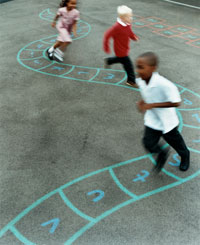Healthy Schools, Healthy Youth
 Schools can help children and adolescents adopt and maintain healthy eating and physical activity behaviors.
Schools can help children and adolescents adopt and maintain healthy eating and physical activity behaviors.
Healthy Schools, Healthy Youth
Childhood obesity has both immediate and long-term effects on health and well-being. The dietary and physical activity behaviors of children and adolescents are influenced by many sectors of society, including schools, families and communities. Schools play a particularly critical role by establishing a safe and supportive environment with policies and practices that support healthy behaviors. Schools also provide opportunities for students to learn about and practice healthy eating and physical activity behaviors.
Guidelines for Promoting Healthy Eating and Physical Activity
 CDC developed nine School Health Guidelines to Promote Healthy Eating and Physical Activity based on a synthesis of research and best practices. Informed by the Dietary Guidelines for Americans,1 the Physical Activity Guidelines for Americans,2 and the Healthy People 2020 objectives, these guidelines serve as the foundation for developing, implementing, and evaluating school-based healthy eating and physical activity policies and practices for students.
CDC developed nine School Health Guidelines to Promote Healthy Eating and Physical Activity based on a synthesis of research and best practices. Informed by the Dietary Guidelines for Americans,1 the Physical Activity Guidelines for Americans,2 and the Healthy People 2020 objectives, these guidelines serve as the foundation for developing, implementing, and evaluating school-based healthy eating and physical activity policies and practices for students.
Physical Education and Physical Activity
Children and adolescents should participate in 60 minutes of physical activity every day. A substantial percentage of students’ physical activity can be provided through a comprehensive, school-based physical activity program that includes: physical education, recess, classroom-based physical activity, walk and bicycle to school, and out-of-school time activities.
Healthy Eating
 Schools can provide access to healthy foods and reinforce healthy dietary behaviors. Schools can ensure that only nutritious and appealing foods and beverages are provided in all food venues in schools, including: school meal programs; à la carte service in the cafeteria; vending machines; school stores and snack bars/concessions stands; fundraisers on school grounds; classroom-based activities; staff and parent meetings; and after-school programs.
Schools can provide access to healthy foods and reinforce healthy dietary behaviors. Schools can ensure that only nutritious and appealing foods and beverages are provided in all food venues in schools, including: school meal programs; à la carte service in the cafeteria; vending machines; school stores and snack bars/concessions stands; fundraisers on school grounds; classroom-based activities; staff and parent meetings; and after-school programs.
- Nutrition Standards for Foods In Schools: Parents, Guardians, Teachers and School Staff [PDF - 1.46MB]
- Nutrition Standards for Foods In Schools: School Boards, School Districts, and Other School Administrators [PDF - 825KB]
- Nutrition Standards for Foods In Schools: School Nutrition Service Personnel [PDF - 825KB]
- Nutrition Standards for Foods In Schools: Students [PDF - 825KB]
Health and Academic Success
 The health of students is linked to their academic success. Both physical activity and healthy eating may help improve academic achievement.
The health of students is linked to their academic success. Both physical activity and healthy eating may help improve academic achievement.
- The Association Between School-Based Physical Activity, Including Physical Education, and Academic Performance [PDF - 2.53MB]
- Physical Inactivity and Unhealthy Dietary Behaviors and Academic Achievement [PDF - 1.5MB]
More Information
Get email updates
To receive email updates about this page, enter your email address:
Contact Us:
- Centers for Disease Control and Prevention
1600 Clifton Rd
Atlanta, GA 30333 - 800-CDC-INFO
(800-232-4636)
TTY: (888) 232-6348 - Contact CDC-INFO



